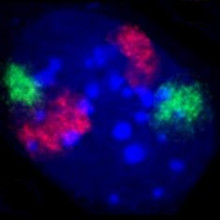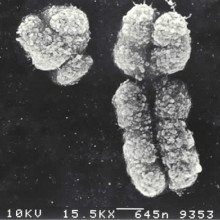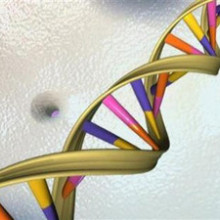The more we understand about the genetic variations that affect our brains, the more questions are raised - for example, are we a product of nature or nurture, and what should we test for? Plus, why Y loss is bad for men, the usefulness of junk DNA, and a crunchy gene of the month.
In this episode

01:06 - Dr David Sweatt - Genetics and learning
Dr David Sweatt - Genetics and learning
with David Sweatt, university of Alabama
Kat - This month I'm reporting back again from the Genetics Society Spring meeting, which was held at the beginning of April at the Royal Society in London. Called "Psychiatric Genetics: Pathways and Prospects", the meeting featured talks from leading scientists from around the world, discussing how genetic research is shedding light on mental illness and improving life for sufferers.One speaker was Dr David Sweatt, from the University of Alabama, who is researching one of the most fundamental questions in brain research - how we make memories.
David - We're interested in how experiences especially learning experience impacts gene readout in the brain. That type of gene readout is known to be necessary to make long term memories. And so, we're interested in the impact of experience on gene transcription in the brain and in particular, focusing on a set of mechanisms call epigenetic molecular mechanisms - those are things like chemical modification of DNA and regulation of the 3-dimensional structure of genes in the brain - and have found that those mechanisms are an important regulator of memory-associated, learning-associated experience dependent alterations in gene readout in the brain.
Kat - So obviously, the challenge is, all our brain cells have the same set of DNA, but they do lots and lots of different things and work lots of different ways. How do you start studying these and unpicking what's actually going on?
David - It is very difficult. There are some new types of approaches that we and others are starting to use where for example, you can use transgenes. You can genetically tag a specific kind of cell or a specific kind of neuron for example that you know is involved in forming a particular kind of memory and then use a procedure called fluorescence activated cell sorting to specifically sort out those specific memory associated cells. And then you can look to see whether the molecular changes that you're interested in happen in that actual specific subset of cells in the brain. That's a new emerging technology but it has promise to solve some of this problem that you're talking about.
Kat - So you're literally pulling out the cells that have made a particular memory. That sounds incredibly powerful. Then how do you look at them? What are you looking for?
David - We are most interested right now in looking for direct chemical reactions that occur with the DNA in the brain - a chemical reaction called DNA methylation, cytosine methylation. So, there are enzymes that put a methyl group on cytosines and those methyl groups, when present, are very powerful regulators of gene readout. And so, we're interested in trying to identify the specific genes and specific types of cells where those changes happen where there's been this actual chemical reaction with DNA to regulate gene readout associated with memory.
Kat - And from what I know of the biology and the chemistry of DNA, this kind of methylation tags, they're usually associated with sort of long term, very static, locking down DNA so genes definitely get switched off. But that doesn't seem to be what's happening in the brain, is it?
David - Certainly, those types of reactions happen in the brain. They're critically important for keeping a neuron a neuron for example. But it does appear as you said that there's an additional set of mechanisms that can dynamically regulate, put methyl groups on and off of this particular subset of genes that may be important for the plasticity of the cell and how it changes its function in response to a transient signal like a learning event.
Kat - Can you tell me a bit about some of the experiments that you actually do to understand what's going on in the brain? What sort of systems are you using?
David - We try to take an integrated approach and so, almost all of our work involves behaving animals. We use a variety of different behavioural paradigms. Most of them are studying some aspects of learning and memory. We use a variety of spatial learning tests like the kind of classic animal in a maze. We use rats and mice for most of our studies. We use a variety of kind of reward mediated behaviours where the animal learns that if they execute a certain behavioural pattern and they can get a reward. And then we also use some training paradigms where an animal recognises that's in a threatening environment. Clearly, a human's cognitive function is much more complicated than a rat or a mouse. And so, we're probably only scratching the surface. But the operating assumption for our work is that there is going to be at least some set of shared molecular and cellular mechanisms that are involved in both animal behaviour and human behaviour.
Kat - How close do you think they are to really understanding how the brain is working at this kind of genetic on and off, what genes are working, what's being switched on when and where?
David - We're about 1 per cent of the way there I would say. Once you start, you really get in there and use a whole epigenome types of approaches with next generation sequencing, and looking at the whole exome - everything that's being transcribed out of the genome - in memory associated cells and start to then overlay all of the regular kind of transcription factors and everything that's involved. It's clearly going to be horrendously complex. And so, it's going to require a lot of heavy lifting in terms of doing the molecular characterisation in terms of the genes and the epigenetic marks that are changing and then a lot of heavy duty computational biology and modelling of that sort of environment - informatics and analysis - to even begin to try and put up together a cohesive, a big picture of the mechanisms reacting with each other and then giving a final output.
Kat - That was David Sweatt, from the University of Alabama.

07:14 - Prof Marcus Munafo - Nature or nurture?
Prof Marcus Munafo - Nature or nurture?
with Prof Marcus Munafo, university of Bristol
Kat - Also at the Genetics Society meeting we heard from Professor Marcus Munafo, from the University of Bristol. He's trying to get to the bottom of another big question in biology - how much of our personality is down to nature, and how much is nurture. I started by asking him what we know so far about how our genes shape our responses to events around us.
Marcus - In my opinion, there aren't many findings that are really robust at least within the context of psychiatric genotypes. So, there has been a lot of interest in for example, whether specific genes influence your sensitivity to stressful life events or in terms of the impact of those stressful life events and your risk of depression, or whether other specific genes specifically impact on the risk of cannabis use leading to Schizophrenia or Schizophrenia-like symptoms. Those stories are very compelling because of course, we want to be able to identify environmental risk factors and in particular, identify people who are most sensitive to them. But the difficulty is that many of those findings have proved hard to reproduce, that you have one initial study which looks very promising but then as other people try to reproduce that finding, the evidence becomes much less consistent.
Kat - And you mentioned stressful life events. I mean, I'm just about to move house. I'm finding that quite stressful, but someone might think, that's just moving. That's fine, but they might think that a divorce or a terrible accident is stressful. How do we define these kind of events? Surely, that's another layer of complexity?
Marcus - Well, that's exactly right and it's the kind of thing that psychologists like myself often get quite animated about. You know, how do we measure these things? Do we want to focus on a projected measurement where people just report things, things that have happened to them or do we want to focus on the subjective impact of those things, so one person might find moving house very stressful and another person might not find it so stressful? If you just asked someone, "Have you moved house?" then you have a measure of whether or not that thing happened to them, but not necessarily what the impact of that potentially stressful life event on that person was.
Kat - And some of the talks we've heard about, they have used animal models of animal learning and animal reward. Can animal models tell us anything about this because presumably, it's a bit easier to control the situations that animals are in?
Marcus - So, one of the great advantages in principle of animal models is exactly that, that you can control the environment much more closely and then you can modify that environment in a parametric way to see what the impact of introducing stress is to animal to a job perhaps genetically identical or from the same strains. And that's great in principle but actually, as more evidence has emerged, it's become clear that what we think of as a highly controlled environment, still does contain a certain amount of variability. So for example, across different experiments, you might have different people handling the animals, different researchers running one experiment or the next experiment. And it seems that even factors like that which we try to control as much as possible can have an impact on the genetic effects that we observed. And we can do as much as we can to train people to behave as consistently as possible when they're in that situation of being a researcher. But we can only do that to a degree. We can automate as many processes as possible, but even then there's going to be stochastic variability in the environment that the animals are in - just random fluctuations in the environment that they find themselves in - that might have an important impact. And so, part of the difficulty is that there's just so much complexity in terms of the nature of the environmental exposures that even in those controlled environments, there may be too much complexity for us to pick out reliable gene environment interactions that we can reproduce over multiple experiments.
Kat - And it's sounding to me like the picture is very complex. The things that happen to us are very complex, are very individual. Our own genetic makeup is individual. What is the future for this kind of research, trying to unpick nature versus nurture?
Marcus - Well, I think the first step is to proceed with the ongoing efforts that exist to identify genetic variants that are directly associated with these outcomes. I think that's the most robust starting point. These very large studies that combine data collaboratively to identify common and increasingly rare genetic variants that are directly associated with our outcomes of interest. Once we've got a better understanding of what the clear, robust, direct genetic associations are with these outcomes of interest, and we know what the environmental exposures are that make a difference, then we can start to look at the interplay between the two, with a bit more confidence that both of the main effects that we're looking at are robust. There'll always going to be technological advances. So, we're moving already from genome wide association studies through to whole genome sequencing, for example, which is going to become common place in the next few years. But there's also increasing interest in the extent at which we can improve the measurements that we take, improve the precision of the phenotypes that we measure and refine the outcomes that we use in the environmental exposures that we use to much more precisely capture what we've been feeling and what we've been experiencing. And that then should improve our ability to detect these genetic effects, these environmental effects, and hopefully, ultimately, they interplay.
Kat - What's the kind of long term goal for this because obviously, understanding whether something is more nature or more nurture and the interplay of our genes in our environment, what would be the aim of this knowledge? What could we do with it?
Marcus - There are a few different aims and what your aim is will depend partly in your perspectives. So, understanding the genetic antecedents of mental health problems and psychiatric illness will hopefully tell us more about the underlying neurobiology and may, in principle identify new drug targets for example. Understanding more about environmental factors that play a role will allow us to again, potentially develop interventions, but also identify at-risk groups. And both of those are important goals in their own right. It's not clear to me at least whether gene environment interactions are actually going to add that much to either of those efforts because of the limitations that exist at the moment in our ability to identify robust replicable interaction effects just because of the sheer complexity of the system that we're dealing with. So at the moment, I think we're on a much firmer ground when we look for direct effects, main effects and it becomes much more complex when we start to look for interaction effects.
Kat - That was Marcus Munafo from the University of Bristol.

13:39 - Remodelling accelerated ageing
Remodelling accelerated ageing
Writing in the journal Science this week, researchers at Cambridge University have made a step forward in understanding - and potentially tackling - Hutchinson-Gilford Progeria Syndrome (HGPS), a rare but distressing accelerated ageing disease. Caused by an unknown genetic fault, people with HGPS age dramatically from 6 months of ages, and usually only live until their teen years.
Researchers now know that cells from HGPS patients contain misshapen and fragile nuclei - the control centre that houses the cell's DNA. The scientists tested a number of different chemicals to find ones that could shore up the structure of the nucleus and heal the cells - with their best candidate being a molecule they've called Remodelin. Next, the researchers went on to find out how Remodelin was working. They discovered that it blocks a molecule called NAT10, which was not previously known to be involved in ageing, and seems to work in a different way from existing drugs.
Only around 150 people worldwide suffer from HGPS, but the researchers hope their work might pave the way for treatments for other diseases that also involve ageing processes, including cancer, and even ways of tackling the problems of old age itself.

14:57 - Y loss is bad for men
Y loss is bad for men
An intriguing study published in Nature Genetics this month suggests a reason why men may have shorter average lifespans and a higher risk of cancer than women - it could be down to misplaced Y chromosomes. Females mammals - including humans - have two X chromosomes, while men have X and Y, with Y being much smaller than the X.
Now an international team of researchers led by scientists at Uppsala University in Sweden have analysed blood from around 1,600 men. They discovered that the loss of the Y chromosome in a proportion of men's blood cells correlates with a shorter lifespan, as well as an increased chance of dying from cancer in other parts of the body, not just blood.
At the moment, it's not at all clear as to how the loss of the Y chromosome is having this effect. the male Y was previously only thought to be associated with jobs such as sperm production, so this is a big mystery that needs to be solved. But once it is, it could help to explain some of the disparities in health between men and women.
15:56 - Human cloning a step closer
Human cloning a step closer
Researchers have created cloned human embryonic stem cells from adult cells for the first time, according to a report in the journal Cell Stem Cell. Last year researchers in the US managed to make cloned embryonic cells using cells from fetuses, but now a team from Korea and the US have achieved this with adult cells.
The researchers managed to inject DNA from adult cells from a 35 or a 75-year old man into donated human eggs, then kick-started them into dividing to create embryonic stem cells - very early cells that can create all the tissues in the body. however, the success rate was very low, with just two viable cloned cells out of 77 attempts.
While the technology is still a long way away from being usable to clone living humans - if that is agreed to be ethically right - the technique could help with generating genetically identical donor organs for transplants. But it still remains to be seen if it's more or less efficient than the recently-discovered alternative for generating stem cells from adult cells - a technique called induced pluripotent stem cells.

17:15 - Prof Hank Greely - Ethics and genetics
Prof Hank Greely - Ethics and genetics
with Prof Hank Greely, Stanford Law School
Kat - Now it's time to hear more from the Genetics Society Spring Meeting, focusing on genes and psychiatric illness. During the course of the meeting, scientists touched on a number of ethical implications and concerns about research and particularly testing for gene variations and faults linked to psychiatric conditions. So it was only fitting that at the end of the day, biological ethics specialist Professor Hank Greely, from Stanford law School, took to the podium to unpack some of these issues in greater depth. I started by asking him to explain some of his fears for this brave new genetic future.
Hank - So, I worry that people will get tests of themselves, their children, their foetuses, their embryos and will be told, "Ooh! There's a 10 times higher than average risk that this person/foetus/embryo will have Schizophrenia" and then will act on it. In terms of the embryo, I'm not sure how great of harm that is. In terms of the foetus - I'm pro-choice in American terms, I'm not opposed to abortions but I don't think aborting for a bad reason or for a scientifically incorrect reason is a good thing, going through that procedure for the woman involved. I think about kids. How would it affect a 12-year-old and his relationship to his parents in the world to be told he's at high risk for getting Schizophrenia?
Kat - Because of course, carrying a gene variation or being told that you have this risk, it's not the same as having the disease.
Hank - That's right. There are times when it almost is. So, if you have 72 CAG repeats on your huntingtin gene, that's the classic 100 per cent - everybody with the genotype gets the phenotype. But the psychiatric diseases, even if you believe some of the studies and their huge replication problems with most of them, the highest risks were seen are about 30 per cent higher. And so, if the background rate is 1 per cent risk for Schizophrenia, 30 per cent increase on 1 per cent is 1.3 per cent. We also have to be careful. People don't understand the difference between relative risk and absolute risk. And so, 30 per cent sounds like a lot.
Kat - That sounds like 30 in 100 people getting it.
Hank - That's right. It sounds like you're going from 1 per cent to 31 per cent, but you're going from 1 per cent to 1.3 per cent, and people aren't going to understand that. So, I think we need to be very careful about how this information gets used with the public. I'm strongly in favour of making sure they're learned professionals in between the genetic information and the individual patient or consumer who can sit down and explain it, and look at you face to face and see where you're confused or where you're troubled by something. The direct-to-consumer movement here has almost religious advocates. So based in the states, people who view, who say, "It's my genome, damn it, and the government isn't going to keep me from getting my hands on it." I think that's crazy.
Kat - The field that I know most about is cancer and cancer genetics. Do you think that psychiatric genetics is kind of a special case and needs to be treated with maybe more care and delicacy than other diseases that affect other parts of the body?
Hank - On balance, yes. I'm a little reluctant to say that because I think we need to normalise psychiatric diseases. They are diseases of the body. They are diseases of the part of the body called the brain. Just like all liver diseases are liver diseases, mental diseases and neurological diseases are all diseases of the brain. And yet, I think in part because of the dualist notion that, no, these are diseases of the mind or diseases of...
Kat - The soul...
Hank - ...or of demonic possession or something else, they are more heavily stigmatised and we do need to be more careful about them. It's also the case that they are harder in some ways to diagnose. If you've got a malignant cancer, pathologists may have trouble figuring out exactly what the underlying initial cell was. But they're not going to have any trouble figuring out you've got a malignant cancer. A lot of the psychiatric disorders are very difficult to diagnose. It's very difficult to define and I think we see that in part with the weakness of the genetic findings.
We know from things like twin studies or sibling concordances that a lot of these diseases have to have powerful genetic components. There's just no other explanation for why 1 per cent of the general population would get, but if you were an identical twin and your twin has it, you have a 70 per cent risk or you have a 10 per cent risk. So, it's got to be genes at work. It's just getting there, particularly when it works through what I think is the most complicated known object in the universe - the human brain, there'll be a lot of complexity: hundreds of genes involved, lots and lots of life experiences, probably lots of unknown and perhaps unknowable times when chance plays a role.
So, I do think we need to be particularly careful about it, mainly because of the potential for stigma, as well as the fact that these are going to be about the most complex things. Any kind of behavioural traits whether it's a mental illness or something like math ability or personality, it's going to be incredibly complex.
Kat - As far as you're concerned, maybe looking into the immediate future, what one thing are you most excited about the potential of genetics for understanding psychiatric disease and what one thing are you most afraid of or concerned about?
Hank - I'm most concerned about, it's possibility for misuse - that people will start using it too early and make decisions about themselves for their family members that will be bad decisions. I'm worried about that because the incentives are all for hype and for exaggerating the power of this. The social incentives for scientists, the incentives for journalists, the incentives for companies all push in one direction and that can lead to bad things. The hope is that this will tell us something about what causes some of these diseases or maybe in some cases, how many different diseases we're dealing with.
I'm not convinced Schizophrenia is one thing. It's like we use to think hepatitis was one thing, inflammation of the liver. We now know there are a lot of different causes of hepatitis and knowing that there are different hepatitis has helped us understand how to treat them and how to cure many of them. So, it's an exciting time of learning more about what's causing these diseases and genetics can give us some clues and maybe even some real answers there. The amount of human suffering that could be avoided with some good treatments or preventions from mental illnesses is truly staggering.
If I had the power to cure or prevent just one disease, I think I'd pick Schizophrenia. 1 per cent of the population has it. It's incredibly disabling and it's incredibly cruel because it usually strikes people. So, just coming in to their own in their late teen years or in their early 20s, normal, happy children become severely, severely disabled by this terrible mental illness. Anything that can help us cure that or even treated better would be a good thing. I think genetics provides some hope, but we're not going to do it tomorrow. It'll be a journey with lots and lots of steps and we have to avoid overhyping any one of the many steps on the path to what could be one of the greatest benefits conferred upon mankind.
Kat - That was Hank Greely from Stanford Law School in California.

What is Junk DNA?
Paulo Amaral, from the Gurdon Institute in Cambridge, explains what is junk DNA...
Paulo - Junk DNA is a term that appeared in the 1970s to describe the part of our DNA that does not have any information to make proteins. To understand why it has been termed junk DNA, we have to briefly consider how we found out how the functions of the main biological molecules. Proteins are very important molecules that make up most of the enzymes and building blocks in our body, including our skin and hair, and have been the focus of biochemistry for over a century. Since the 1950s and '60s, we recognise that DNA is the genetic material inherited from our parents and that it has information to make proteins. We discovered these based on the study of bacteria which are relatively simple, easy to grow in the lab, and in which most of the DNA is used to make proteins. However, there are many fundamental differences between bacteria and us. For example, it turns out that humans and other complex organisms have DNAs that are very big. In fact, millions of times bigger than that of bacteria. This was a surprise to many. Most of our DNA does not encode proteins. About 98 per cent is non-coding and only 2 per cent has information to make proteins. At the time of this discovery, it seemed that all this extra DNA was disorganised and repetitive and that some consider it to be junk. This has stuck for a long time. After decades of research, we yet don't know what proportion of our DNA has no function at all. If you consider that original concept of junk DNA, we could simply not survive without it. We now know that some of this DNA is actually very important. For example, for embryonic development and that many diseases including cancers are caused by small defects in the non-coding DNA. This is now a very active area of research and we are just beginning to understand the functions of non-coding DNA. For example, some of these non-coding DNAs act as switches that control when genes should be turned on or off in different parts of the body. Others make several thousands of molecules called RNAs which have a vast array of functions on their own and are not used to make proteins. Interestingly, the part of our DNA that makes proteins are essentially the same in all animals. What changes the non-coding DNA which roughly increases in proportion in more complex animals such as mammals, compared to more simple ones such as worms or marine sponges. For most of the information that makes the animal species different from each other, including humans from other animals, seems to be in the non-coding DNA. So, if you're asking me, what would happen if you could remove all the junk DNA from us and survive, I would say that we would all look like baker's yeast at best.
Kat - Thanks to listener Richard Thornley for that question, and also to Paulo Amaral from the Gurdon Institute in Cambridge and Harriet Johnson. And if you've got any questions about genes, DNA and genetics, just email them to me at genetics@thenakedscientists.com.

28:30 - Gene of the Month - Tempura
Gene of the Month - Tempura
with Kt Arney
Kat:: And now, it's time for our crisp and crunchy Gene of the Month - it's called Tempura, named after the Japanese deep-fried battered treat. Found in fruit flies, Tempura is a newly-discovered component of something called the Notch pathway - a biological messaging system that helps cells work out what to do. The protein made by the Tempura gene controls the release of two other proteins in fly cells called Scabrous and Delta, which are involved in Notch signalling.
Researchers have discovered that Tempura is a type of enzyme called - rather wonderfully - a geranylgeranyltransferase, meaning it sticks small chemicals - called geranylgeranyl - onto other proteins. A useful function, but perhaps not as tasty as being dipped in batter and fried.










Comments
Add a comment